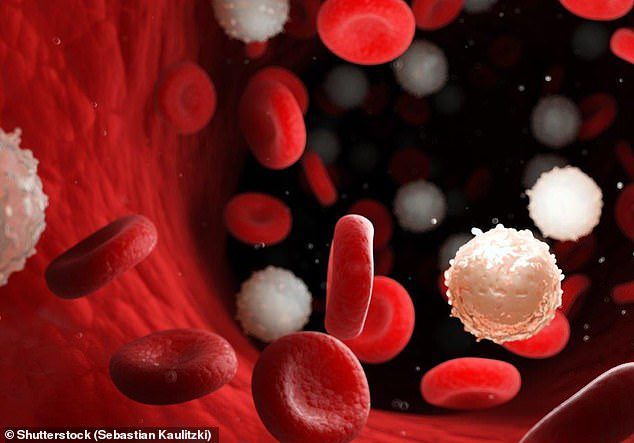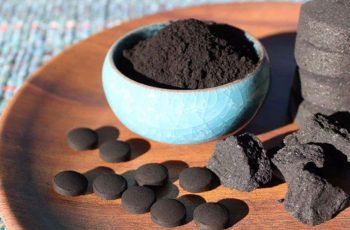An experimental leukemia drug can fight the blood cancer without causing toxic side effects, researchers say after testing it human patients for the first time.
Drugs for chronic myeloid leukemia, called kinase inhibitors, come with the risk of vomiting, diarrhea and muscle pain, and they can also stop working after time.
But a trial of asciminib – a new drug which works in the same way – found it is effective and ‘well-tolerated’ by patients.
The researchers said it was a ‘breakthrough’ in treating chronic myeloid leukemia (CML), which most commonly affects people in their 60s, and offers an extra option for patients who have exhausted other drugs.
Scientists also claim it could spare thousands of patients the side effects because it does not inadvertently kill healthy cells at the same time.

The drug could be used to treat chronic myeloid leukemia, scientists said, which causes the body to create too many white blood cells which clog up the bone marrow and mean there is less room for other types of important cells (stock illustration)
Results of the 150-patient trial – the first to be done on humans – found asciminib was not toxic and appeared to work effectively inside the patients.
Asciminib slows down the blood cancer by shutting down specific cancer-causing enzymes called kinases – it is part of a class of drugs known as kinase inhibitors.
Doctors around the world praised the creation of the first tyrosine kinase inhibitor (TKI) called imatinib in the 1990s.
Study co-author Professor Tim Hughes, of the South Australian Health and Medical Research Institute, said it changed the lives of patients with the disease.
He said: ‘[Imatinib] changed CML from a death sentence to a disease that in many patients could be managed until they lived to a ripe old age.
‘But while imatinib and subsequent TKIs have been very effective at improving survival, they frequently cause serious side-effects.’
As many as 95 percents of TKI patients can suffer side effects from their cancer drugs, although experiences vary from patient to patient.
Side effects can be severe and include life-threatening conditions such as heart failure and liver pain.
They can also stop working if people have been taking them for a long time, and there are a limited number of options for patients to try.
Professor Hughes claimed if the drug is successfully developed and put into use it would be the biggest breakthrough in leukemia treatment since the 90s.
Alasdair Rankin, the director of research at leukemia charity Bloodwise, told MailOnline it would be ‘amazing’ and ‘lifesaving’ for some patients to have an extra option.
‘Some treatments start to fail and patients have to move on,’ he said.
‘Many people are able to move on, but it’s really worrying that some people run out of options.
‘And some of the options available that far down the line might have serious cardiac side effects and you might not want to use it.
‘A treatment like this one sounds like it’s been effective. It’s a first-in-man trial so they’re trying to see if it’s toxic or not. The study’s in a high profile journal because it’s had good results.
‘This could be lifesaving for people who have failed treatment on existing TKIs – this is a new option for them, although we would say more research needs to be done.’
Chronic myeloid leukemia is a slow-growing cancer of the white blood cells which takes years to progress – it is most common among over-60s.
People with CML tend to live with the disease under control, rather than having it cured completely.
Around 750 people are diagnosed with CML each year in the UK along with approximately 9,000 in the US.
More than 6,000 people in Britain were living with the disease in 2010, according to Cancer Research UK.
Survival rates are good – around three-quarters of patients on treatment now live for five years or more after their diagnosis.
Professor Hughes and team tested asciminib on 150 patients, which proved the drug worked and was ‘durable’.
The drug could not be tested on its own because the patients were having ongoing cancer treatment.
The study was carried out by giving patients doses of between 10mg and 200mg of asciminib once or twice a day and following them up for around 14 months.
It found that the drug was active inside the patients’ bodies, even while they were having other cancer treatment.
Some patients suffered from fatigue, headaches, high blood pressure, joint pain or low platelet counts.
Five patients also got pancreatitis – a swollen pancreas. Despite the side effects, the researchers said the test was a success.
Professor Hughes added: ‘This trial showed asciminib is highly effective, even in patients who’d failed to respond to several other TKIs.
‘Equally as important, it’s well tolerated by patients and appears to have significantly fewer long-term ill-effects compared to current treatments.’
Current CML medications, taken as pills, work by blocking proteins which can cause cancerous cells to multiply.
By continuously blocking them over a long period of time, the drugs are intended to keep cancer under control and stop it spreading.
But they can also block proteins which carry out normal functions. This may damage or destroy cells which are vital for the body to keep functioning normally.
Tests confirmed asciminib – supplied by Novartis Pharmaceuticals – only attacked the leukemia proteins and not the healthy ones.
The research was published in the New England Journal of Medicine.
If you know someone who might like this, please click “Share”!




